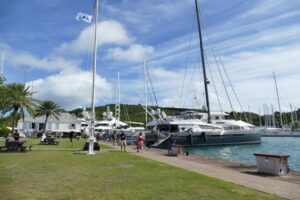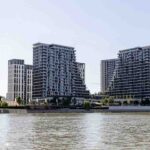The Antigua tax residency program appeals to appeals to foreign nationals seeking to reduce their tax bill. The program is still under review and not yet officially available, but it could offer the opportunity to establish tax residency and leverage tax advantages with minimal residency requirements, including no personal income tax, capital gains, inheritance, or wealth tax. This guide provides everything you need to know, including:
Antigua Tax Residency Program Overview

In short, foreign nationals must earn at least $100,000, pay a fixed annual tax of $20,000, and reside in the country for at least 30 days a year, exempting them from the regular 183-day rule to acquire tax residency.
Important note: While the program is attractive, its availability is uncertain, as it is currently undergoing government review and has yet to be officially announced.
Eligibility Criteria for Antigua Tax Residency
While it’s relatively straightforward to obtain Antigua tax residency, there are several Antigua tax residency requirements to qualify for the program and maintain tax compliance.
Annual income requirement
Program applicants are required to earn a minimum self-employment income of $100,000 annually. The income can be earned from self-employment or International Business Companies.
Residential address in Antigua and Barbuda
Applicants must have a physical address in Antigua and Barbuda, which can be rented, leased, or owned. Many applicants choose the property ownership option through the Antigua and Barbuda citizenship by investment program, allowing foreigner investors to make a foreign direct investment in Antigua real estate to become Antigua and Barbuda citizens.
Flat tax payment
Investors can avoid personal or corporate income tax obligations by paying a flat annual tax payment of $20,000 for up to four years.
Physical presence requirement
After obtaining Antigua and Barbuda residency for taxes, successful applicants must maintain a minimum presence of 30 days in Antigua and Barbuda per year.
Benefits of Antigua Tax Residency
Tax exemptions
The primary benefit of the Antigua tax residency program is a tax incentive that excludes local and worldwide income earned from taxable income. Successful applicants of the program do not pay Antigua and Barbuda tax on capital gains, inheritance, or wealth.
Permanent residency certificate
Successful applicants are entitled to an Antigua and Barbuda permanent residence permit, provided they fulfill the minimum residency requirement.
Offshore banking
Offshore banks in Antigua allow account holders to optimize their taxes. Individuals can establish International Business Companies (IBCs) and leverage tax benefits such as a zero local and worldwide income and withholding tax rate.
Antigua Tax Residency Application Process
Required documents
- Valid passport
- Completed application form
- Financial statements proving an annual income exceeding $100,000
- Evidence of residential address in Antigua and Barbuda
- Police clearance certificate
- Medical certificate
- Passport-sized photographs
- Proof of payment of the flat tax fee
Step-by-step application process
Meet the income requirement
- Ensure you earn at least $100,000 in foreign income annually.
- Acquire a residential address
- Obtain a residential address by signing a lease or buying a property in Antigua.
- Prepare required documents
- Valid passport
- Proof of income (bank statements)
- Police clearance certificate from the applicant’s country of residence
- Proof of residential address (utility bill, lease agreement, or title deed)
- Completed tax residency application form
- Submit application
- Submit your application along with supporting documents to the Antigua and Barbuda Inland Revenue Department (IRD).
- Review
- The government reviews the application, verifies financial standing, and conducts background checks.
- Receive Tax Residency Certificate
- Once approved, you’ll applicant receive an official tax residency certificate.
- Maintain residency
- To keep tax residency in Antigua, you must spend at least 30 days per year in Antigua and Barbuda and continue making the annual $20,000 flat tax payment.
Maintaining Tax Residency Status
Annual requirements
The minimum residency requirement and annual tax payment are two key obligations to maintain Antigua tax resident states.
Minimum residency: Foreign investors who reside in Antigua and Barbuda for at least 30 days per year. The physical presence in the country can be continuous or broken up into several trips, provided the collective number of days reaches at least 30.
Flat tax payment: Foreign investors are required to pay an annual flat tax of $20,000 to the Inland Revenue Department. This does not require submitting a tax return or other Antigua tax forms.
Consequences of non-compliance
Antigua tax resident status is a privileged opportunity for investors and legal entities to avoid double taxation or qualify for foreign tax relief, so compliance is key to maintaining the advantages of Antigua taxes. Non-compliance with the program’s requirement may result in loss of tax resident status, resulting in obligations to pay taxes in Antigua or other jurisdictions.
Comparing Antigua's Tax Residency Program to Others
Antigua and Barbuda | Greece | Italy | |
Program Name | Tax Residency Program | Non-Dom Regime | Non-Dom Regime |
Income Requirement | $100,000 | €100,000 | €200,000 |
Investment Requirement | Residential property lease or ownership | Golden Visa holder or €100,000 investment | €1 million investment |
Residency Requirement | 30 days annually | 183 days annually | 183 days annually |
Tax Payment | $20,000 annually | €100,000 annually | €200,000 |
Program Length | 4 years | 15 years | 15 years |
Program Benefits | No income tax | No foreign income tax | No foreign income tax |
Antigua Tax Residency for US Citizens

Foreign Tax Credit: The Foreign Tax Credit (FTC), available through FORM 1116, allows American taxpayers who live and invest in Antigua and Barbuda to deduct income taxed by foreign governments.
Foreign Earned Income Exclusion: The Foreign Earned Income Exclusion (FEIE), available through Form 2555, allows Americans with Antigua tax residency to exclude income derived in the country from their US taxable income.
Foreign Housing Exclusion: US taxpayers who own or lease a primary residence in Antigua can deduct housing-related expenses such as property tax from their US tax bill by claiming the Foreign Housing Exclusion. Applicants must claim it with Form 2555.
Other Ways to Become an Antigua Tax Resident
Antigua’s tax residency program allows high earners to enjoy tax incentives like no personal income tax by paying a flat tax payment and residing in the country for at least 30 days annually. Alternatively, foreign nationals can fulfill the 183-day rule to gain to become Antigua and Barbuda tax residents by applying for the Antigua and Barbuda citizenship by investment program.
The program was introduced to attract foreign direct investment by offering Antigua and Barbuda citizenship to foreigners who make a non-refundable contribution to the National Development Fund or University of the West Indies Fund, purchase real estate, or invest in a business.
The Antigua and Barbuda Citizenship by Investment Unit (CIU) oversees the program, and successful applicants obtain second citizenship and a powerful Antigua and Barbuda passport providing enhanced visa free travel.

Frequently Asked Questions about the Antigua and Barbuda Tax Residency Program
What is the minimum income required for Antigua tax residency?
The minimum income required to get Antigua tax residency through the tax residence program is $100,000 annually.
How much time must I spend in Antigua and Barbuda to maintain tax residency?
Antigua tax residents of the tax residence program are required to spend a minimum of 30 days each year in the country.
What taxes are exempted for Antigua tax residents?
Antigua tax resident program applicants do not pay personal income tax, capital gains tax, inheritance tax, and wealth tax.
Is the $20,000 flat tax in addition to other taxes?
The $20,000 flat tax is an annual fee in Antigua tax law that replaces traditional income tax obligations for tax residents. Residents are required to pay other taxes such as value added tax (sales tax), and corporate tax.
Can I work in Antigua and Barbuda under the tax residency program?
Tax residents in Antigua and Barbuda are permitted to work and earn self-employment income. However, you should consult with local tax authorities to maintain tax compliance.
How to become an Antigua tax resident?
You can become an Antigua and Barbuda tax resident and get a Tax Identification Number by residing in the country for at least 183 in a year. Alternatively, the country’s tax residency program allows foreign investors to establish tax residency by earning an income exceeding $100,000 annually, signing a property lease or making a real estate investment, paying a flat annual tax of $20,000, and residing in the country for at least 30 days annually.
Do Antigua and Barbuda tax residents pay property tax?
Antigua and Barbuda tax residency eliminates personal income tax and other taxes like wealth, inheritance, and capital gains tax. However, the country is not a pure tax haven and all Antigua and Barbuda residents who lease or own property must pay an annual real estate tax based on the property’s assessed market value.

 Meet the income requirement
Meet the income requirement

